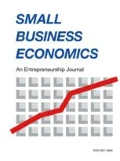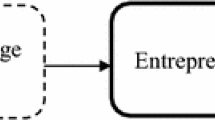Abstract
In this paper, we give a general introduction to the notion of entrepreneurship and how it has many complex meanings. Entrepreneurs in new firms but also in incumbent firms have a key role in local, regional and national economic development by taking risks to get things done by developing new combinations of ideas and/or doing things differently. In view of this, two of the main questions that are dealt with are: (1) which features make structural differences in institutions and innovation networks remain invariant between decades, and (2) how knowledge about such features can be employed in policy at the national and the regional level. The research questions highlighted in this special issue relate to many pertinent national and regional policy issues. The most apparent concerns conditions conducive for entrepreneurship in the form of new firms and firm growth. In this paper, we also introduce the different contributors to this special issue.
Similar content being viewed by others
Notes
The 15th Uddevalla symposium was organised and sponsored by University West, Trollhättan, Sweden in co-operation with The University of Algarve, (CIEO), Faro, Portugal, The School of Public Policy, George Mason University, USA, The Centre of Excellence for Science and Innovation Studies (CESIS), The Royal Institute of Technology, Stockholm, and Jönköping International Business School, Jönköping, Sweden, The Centre for Innovation, Research and Competence in the Learning Economy (CIRCLE), Lund University, Sweden, and The Centre for Entrepreneurship and Spatial Economics (CEnSE), Jönköping International Business School, Sweden. The best paper awards were financed by the municipality of Uddevalla, Sweden.
References
Almeida, P., & Kogut, B. (1999). The Localization of knowledge and the mobility of engineers in regional networks. Management Science, 45, 905–917.
Andersson, M., Baltzopoulos, A., & Lööf, H. (2012). R&D strategies and entrepreneurial spawning. Research Policy, 41, 54–68.
Andersson, M., & Koster, S. (2011). Sources of persistence in regional start-up rates: Evidence from Sweden. Journal of Economic Geography, 11, 179–201.
Audretsch, D. B., & Feldman, M. P. (2003). Knowledge spillovers and the geography of innovation. In Henderson, J. V. & J.-F. Thisse (Eds.), Handbook of urban and regional economics (pp. 2713–2739). Amsterdam: North Holland.
Autant-Bernard, C., Billand, P., & Massard, N. (2012). Innovation and space: From externalities to networks. In C. Karlsson, B. Johansson, & R. R. Stough (Eds.), The regional economics of knowledge and talent. Local advantage in a global context (pp. 63–97). Cheltenham: Edward Elgar.
Bathelt, H., Malmberg, A., & Maskell, P. (2004). Clusters and knowledge: Local buzz, global pipelines and the process of knowledge creation. Progress in Human Geography, 28, 31–56.
Carlsson, B., Braunerhjelm, P., McKelvey, M., Olofsson, C., Persson L., & Ylinenpää, H. (2013). The evolving domain of entrepreneurship research. Small Business Economics. Accessed on Sept 2013.
Ejermo, O., & Xiao, J. (2014). Entrepreneurship and survival over the business cycle: How do new technology-based firms differ? Small Business Economics: Special Issue on Entrepreneurship and Innovation Networks, forthcoming.
Fritsch, M., Bublitz, E., Sorgner, A., & Wyrwich, M. (2014). How much of a socialist legacy? The re-emergence of entrepreneurship in the east german transformation to a market economy. Small Business Economics: Special Issue on Entrepreneurship and Innovation Networks, forthcoming.
Huber, F. (2012). Do clusters really matter for innovation practices in information technology? Technological knowledge spillovers. Journal of Economic Geography, 12, 107–126.
Johansson, B., & Quigley, J. (2004). Agglomeration and networks in spatial economics. Papers in Regional Science, 83, 165–176.
Karlsson, C. (2012). Entrepreneurship, social capital, governance and regional economic development: An introduction. In C. Karlsson, B. Johansson, & R. R. Stough (Eds.), Entrepreneurship, social capital and governance. Directions for the sustainable development and competitiveness of regions (pp. 1–26). Cheltenham: Edward Elgar.
Karlsson, C., & Johansson, B. (2006). Dynamics and entrepreneurship in a knowledge-based economy. In C. Karlsson, B. Johansson, & R. R. Stough (Eds.), Entrepreneurship and dynamics in the knowledge economy (pp. 12–46). New York: Routledge.
Karlsson, C., Andersson, Å. E., Cheshire, P., & Stough, R. R. (2009a). Innovation, dynamic regions and regional dynamics. In C. Karlsson, Å. E. Andersson, P. Cheshire, & R. R. Stough (Eds.), New directions in regional economic development (pp. 1–33). Berlin: Springer.
Karlsson, C., Johansson, B., & Stough, R. R. (2009b). Introduction: Innovation and entrepreneurship in functional regions. In C. Karlsson, B. Johansson, & R. R. Stough (Eds.), Entrepreneurship and innovations in functional regions (pp. 1–20). Cheltenham: Edward Elgar.
Karlsson, C., Johansson, B., & Stough, R. R. (2012). Introduction: Innovation, technology and knowledge. In C. Karlsson, B. Johansson, & R. R. Stough (Eds.), Innovation, technology and knowledge (pp. 1–24). London: Routledge.
Keeble, D. (2000). Collective learning processes in European high-technology milieux. In D. Keeble & F. Wilkinson (Eds.), High-tech clusters, networking and collective learning in Europe (pp. 199–229). Aldershot: Ashgate.
Klepper, S. (2001). Employee start-ups in high-tech industries. Industrial and Corporate Change, 10, 639–674.
Klepper, S., & Sleeper, S. (2005). Entry by spin-offs. Management Science, 51, 1291–1306.
Koschatzky, K. (2009). Science-based regional development in a small region: Scope of collective action for regional governments. In C. Karlsson, B. Johansson, & R. R. Stough (Eds.), Innovation, agglomeration and regional competition (pp. 325–345). Cheltenham: Edward Elgar.
Koster, S., & Karlsson, C. (2010). New firm formation and economic development in a globalizing world. In C. Karlsson, B. Johansson, & R. R. Stough (Eds.), Entrepreneurship and regional development. Local processes and global patterns (pp. 44–66). Cheltenham: Edward Elgar.
Lööf, H. & Nabavi, P. (2014). Survival, productivity and growth of new ventures across locations. Small Business Economics: Special Issue on Entrepreneurship and Innovation Networks, forthcoming.
Moilanen, M., Øsbye, S., & Woll, K. (2013). Non-R&D-SMEs: external knowledge, absorptive capacity and product innovation. Small Business Economics: Special Issue on Entrepreneurship and Innovation Networks, forthcoming.
Nyström, K., & Zhetibaeva Elvung, G. (2014). New firms and labour market entrants: Is there a wage penalty for employment in new firms? Small Business Economics: Special Issue on Entrepreneurship and Innovation Networks, forthcoming.
Pittaway, L., Robertson, M., Munir, K., Denyer, D., & Neely, A. (2004). Networking and innovation: A systematic review of the evidence. International Journal of Management Reviews, 5, 137–168.
Saxenian, A. L. (1996). Regional advantage: Culture and competition in Silicon Valley and Route 128. Cambridge, MA: Harvard University Press.
Schott, T., & Sedaghat, M. (2014). Innovation embedded in entrepreneurs’ networks and national educational systems. Small Business Economics: Special Issue on Entrepreneurship and Innovation Networks, forthcoming.
Storper, M., & Venables, A. J. (2004). Buzz: Face-to-face contact and the urban economy. Journal of Economic Geography, 4, 351–370.
Tavassoli, S., & Carbonara, N. (2014). The role of knowledge variety and intensity for regional innovation. Small Business Economics: Special Issue on Entrepreneurship and Innovation Networks, forthcoming.
Wolfe, D. A., & Gertler, M. S. (2004). Clusters from the inside and out: Local dynamics and global linkages. Urban Studies, 41, 1071–1093.
Wolff, E. N. (2012). Spillover, linkages, and productivity growth in the US economy, 1958–2007. In M. Andersson, B. Johansson, C. Karlsson, & H. Lööf (Eds.), Innovation and growth. From R&D strategies of innovating firms to economy-wide technological change (pp. 233–265). Oxford: Oxford University Press.
Author information
Authors and Affiliations
Corresponding author
Rights and permissions
About this article
Cite this article
Karlsson, C., Warda, P. Entrepreneurship and innovation networks. Small Bus Econ 43, 393–398 (2014). https://doi.org/10.1007/s11187-014-9542-z
Accepted:
Published:
Issue Date:
DOI: https://doi.org/10.1007/s11187-014-9542-z




